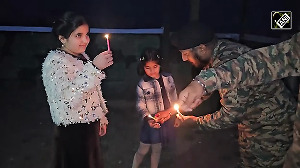Ollapally, professorial lecturer and associate director of the Sigur Center for Asian Studies at the Elliot School of International Affairs at George Washington University, also told rediff.com that the name Deccan Mujahideen, akin to the earlier terrorist attack claimants calling themselves Indian Mujahideen, was obviously a ploy to confuse people that the terrorists were indigenous and home-grown, when it was highly unlikely it was so.
"Not only is it unprecedented, but also the fact that this group apparently laying claim for this -- the Deccan Mujahideen -- is completely unknown, and so the question is, these new names are now coming up, no one really knows what the true source of these are."
Ollapally said, "It's almost as if they are playing a guessing game, and it's a pattern you've seen in other places. You've seen it, when a group is banned they come up with a different name. But, also having these different names, it creates a lot of confusion because Indian Mujahideen, Deccan Mujahideen, they are trying to associate themselves as being internal, indigenous, home-grown and all that."
"But the point is, to what extent is that really the case -- one doesn't know that," she said. "It's almost as if that is their intent, to show that it is internal when it may not be so at all."
Ollapally said, "The way in which this was carried out, it does suggest that they needed some fairly sophisticated, coordinated planning. And, if the reports are true about their rounding up Americans and British, then it sounds like there is an Al Qaeda hand possibly, which again would be the most obvious difference between every other terrorist attack that has gone on before (in India)."
"And, then the point of, what is the motive for this. It's not as if something sparked it off. It's really not clear. The question is, whether it's a new phenomenon. Is it a new strategy? What then is the objective?"
Ollapally acknowledged that "this is definitely going to hurt India -- from tourism to business. That was obviously one of the motives, but the question is the timing. Why now?"
She acknowledged, "Who knows if it had anything to do with the presidential transition here in the US? And, there are elections coming up in India also. So, that's the other thing -- whether it is to destabilise India. And, there have been criticism that the current government has not been acting swiftly and so forth," to combat the scourge of terrorism in India.
"So, they can use this for electoral reasons also," Ollapally said, "but again, all this is complete speculation."
However, she agreed that "there has been all this speculation about testing the US, the incoming administration, although this doesn't really jell. I mean, if it were the Al Qaeda and they wanted to test Obama, there are other places where they can do it that would be much more front and centre that would capture the US attention much more. So, this seems probably a little far-fetched."
Ollapally also speculated that "on the one hand, you've got the Indian foreign minister and the Pakistani foreign minister speaking and they have been making some progress and so forth, so this could be to destabilise that -- to throw these talks off."
She recalled that "when the Indian embassy in Afghanistan was bombed, the US intelligence did find the Pakistani intelligence connected. So, you cannot rule out any of these things."
"It's one thing to have summitry between India and Pakistan, but the point is, unless Pakistan really cracks down on the groups that operate there -- and that requires almost a mini internal war on terrorism -- this is not going to stop."
Ollapally said the Pakistanis evidently don't want to do this "and part of the reason is, of course, it's an instrument that they still need to hold on to."
She said, "This difference about this to me is that fact that they've arrested some people. This is the first time really that they've been able to get the suspects on the spot. Earlier, they had never been able to get the suspects on the spot. So, the question is, whether they'll be able to have some better information because of that -- one would assume so."
Ollapally argued that the simple notion that this was a case of disaffected youth carrying this out seemed highly unlikely. "There are disaffected youth in a lot of places. But, to go from disaffection to action is something different -- it's a giant leap."
"So, you can't simply say that there's a huge amount of disaffected youth and, therefore, they carried it out," was a stretch. "I think you need that intervening critical variable and so this is usually some other organisation or group that has much more resources and the skill to implement this thing."
Ollapally said this is why she strong believes that "this particular attacks would be some small group that came out of nowhere and calling themselves the Deccan Mujahideen. Somehow, that's really out of character with everything in the past, if you see the way in which these things (most other recent terrorist attacks) have happened in India -- at least of this scale and sophistication."
Ollapally said it is imperative "to get to the root of some of these things, because otherwise this is not going to go away. This is a nightmare -- a huge problem, and with all of the implications that come with it."





